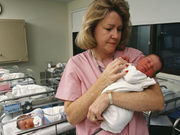Meds in hospitalized high-risk infants linked to necrotizing enterocolitis, increased risk of death
THURSDAY, April 28, 2016 (HealthDay News) — Despite reported risks, nearly one in four infants in neonatal intensive care units (NICUs) are given histamine-2 receptor antagonists or proton pump inhibitors, according to a study published April 27 in The Journal of Pediatrics.
Jonathan Slaughter, M.D., of Nationwide Children’s Hospital in Columbus, Ohio, and colleagues analyzed data from 43 children’s hospitals across the United States from 2006 to 2013. They found that 23.8 percent of the 122,002 newborns received either a histamine-2 receptor antagonist or a proton pump inhibitor.
Babies most likely to be given the drugs were those diagnosed with gastroesophageal reflux disease; congenital heart disease; and ear, nose and throat conditions. But “there’s actually little evidence that acid suppression helps in the NICU at all,” Slaughter said in a news release. Several studies have linked use of these drugs in hospitalized high-risk infants to necrotizing enterocolitis and an increased risk of death.
The researchers did find that the percentage of babies treated with histamine-2 receptor antagonists declined some during the study period. While the percentage of babies treated with proton pump inhibitors rose until 2010, it declined afterward. “It’s encouraging that doctors are starting to pay attention to the warnings and decrease usage,” Slaughter said.
Copyright © 2016 HealthDay. All rights reserved.








